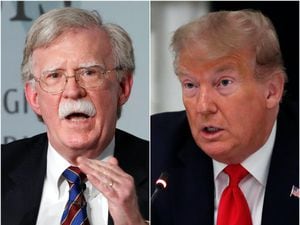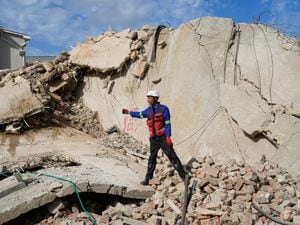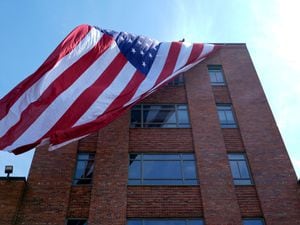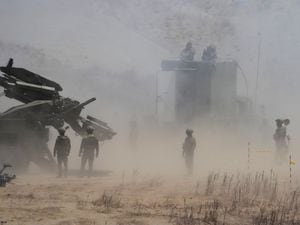Trump’s former national security adviser can publish tell-all book, judge rules
John Bolton’s memoir, due out on Tuesday, paints an unflattering portrait of President Donald Trump’s foreign policy decision-making.

A US federal judge has ruled that former national security adviser John Bolton can move forward in publishing his tell-all book despite efforts by the Trump administration to block the release because of concerns that classified information could be exposed.
The decision from US District Judge Royce Lamberth is a victory for Mr Bolton in a court case that involved core First Amendment and national security concerns.
But the judge also made clear his concerns that Mr Bolton had “gambled with the national security of the United States” by taking it upon himself to publish his memoir without formal clearance from a White House that says it was still reviewing it for classified information.
“Defendant Bolton has gambled with the national security of the United States. He has exposed his country to harm and himself to civil (and potentially criminal) liability,” Judge Lamberth wrote.
“But these facts do not control the motion before the court. The government has failed to establish that an injunction will prevent irreparable harm.”
The White House signalled the legal fight would continue, saying it would try to prevent Mr Bolton from profiting off the book.
From a practical perspective, the ruling clears the path for a broader election-year readership and distribution of a memoir, due out on Tuesday, that paints an unflattering portrait of President Donald Trump’s foreign policy decision-making during the turbulent year-and-a-half that Mr Bolton spent in the White House.
Soon after the ruling was released, Mr Trump tweeted that Mr Bolton “broke the law by releasing Classified Information (in massive amounts). He must pay a very big price for this, as others have before him. This should never to happen again!!!”
Mr Bolton’s lawyer, Chuck Cooper, applauded Judge Lamberth for denying the government’s attempt to “suppress” the book.
Publisher Simon & Schuster said the decision “vindicated the strong First Amendment protections against censorship and prior restraint of publication”.
While declining to halt the book’s release, Judge Lamberth did suggest Mr Bolton may have left himself open to potential criminal prosecution by publishing classified information and that the government may prove successful in preventing him from benefiting financially.
The White House indicated it planned to do exactly that, saying in a statement that the government “intends to hold Bolton to the further requirements of his agreements and to ensure that he receives no profits from his shameful decision to place his desire for money and attention ahead of his obligations to protect national security”.
Mr Bolton’s lawyers insisted that he had spent months addressing White House concerns about classified information and that Mr Bolton had been assured in late April by the official he was working with that the manuscript no longer contained any such material.

Mr Bolton’s team said the Trump administration’s efforts to block the book were a pretext to censor him for an account that the White House found unfavourable.
The Justice Department sued in the past week to block the book’s release and to demand that copies be retrieved.
Officials said the book contained classified information and that Mr Bolton had failed to complete a pre-publication review process meant to ensure former government officials do not improperly disclose national security secrets in books they write.
The administration submitted written statements from multiple officials attesting to the national security concerns of releasing the book.
The judge did not take issue with those concerns in his 10-page order.
But with 200,000 copies of the book already distributed to booksellers across the country, attempting to block its release would be futile, Judge Lamberth wrote.
Major media organisations also obtained the book and published comprehensive accounts about it.
“In taking it upon himself to publish his book without securing final approval from national intelligence authorities, Bolton may indeed have caused the country irreparable harm. But in the internet age, even a handful of copies in circulation could irrevocably destroy confidentiality,” Judge Lamberth wrote.
Just one individual with a book in hand could publish its contents from a local coffee shop, he said.
“With hundreds of thousands of copies around the globe – many in newsrooms – the damage is done. There is no restoring the status quo,” the judge wrote.
The Room Where It Happened: A White House Memoir depicts a president whose foreign policy objectives were inexorably linked to his own political gain.
Mr Bolton says Mr Trump “pleaded” with China’s Xi Jinping during a 2019 summit to help Mr Trump’s re-election prospects.
The former national security adviser writes that Mr Trump linked the supply of military assistance to Ukraine to that country’s willingness to conduct politically charged investigations into former vice president Joe Biden and his son Hunter.
The allegations were at the heart of an impeachment trial that ended with Mr Trump’s acquittal by the Senate in February.
Other administration officials who figure prominently in the book, including secretary of state Mike Pompeo, denied comments or actions that were attributed to them and joined the president in condemning the book.
Even Democrats who pounced on some of Mr Bolton’s anecdotes to condemn the president nonetheless expressed frustration that he had saved them for his book instead of participating in the impeachment case.
Mr Bolton refused to voluntarily give evidence in the impeachment inquiry, and the House of Representatives ultimately moved forward with its case without subpoenaing him.





